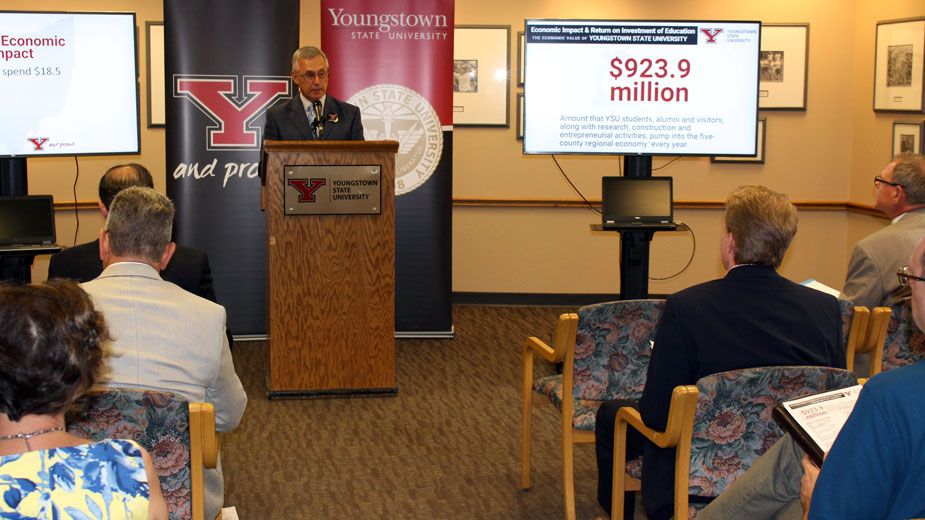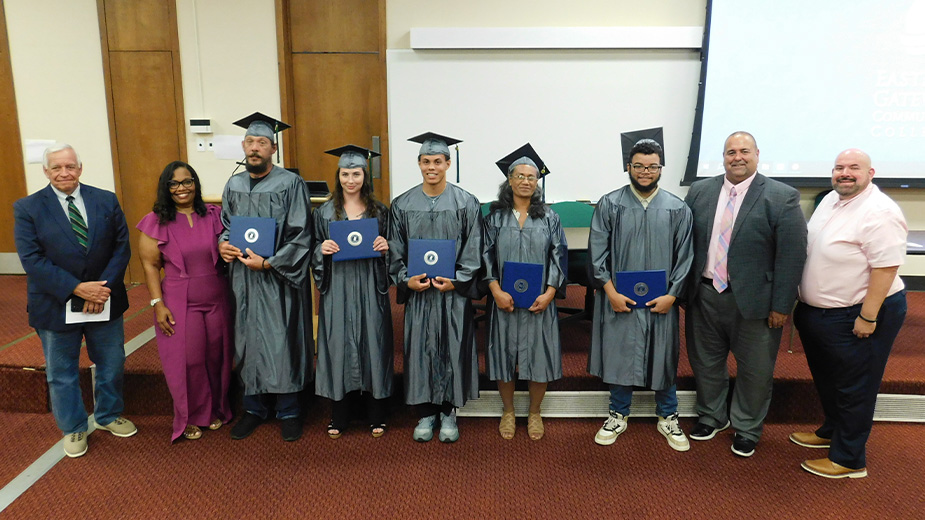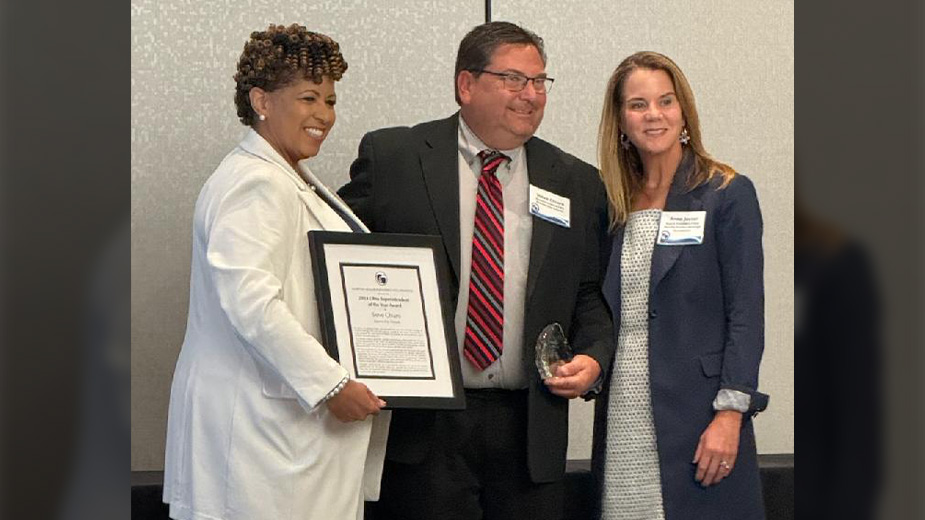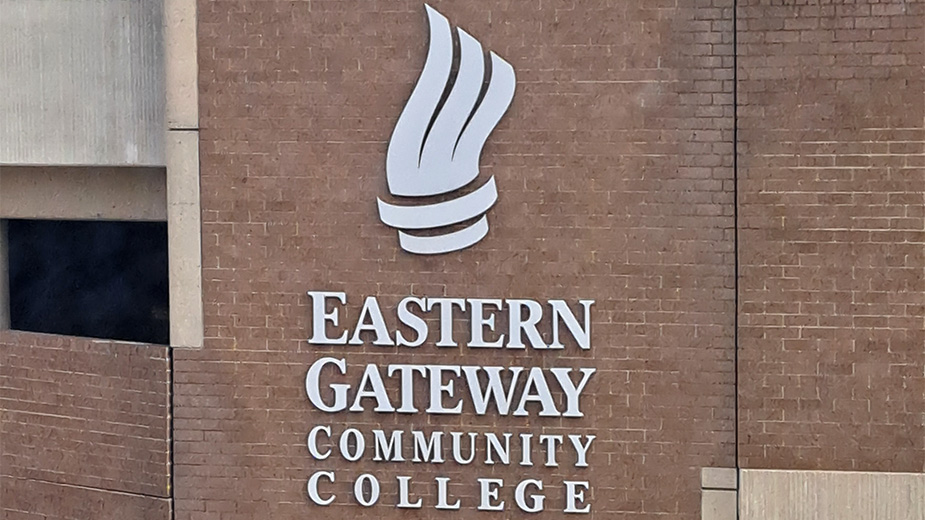YSU Shows Strong Return on Investment, Education
YOUNGSTOWN, Ohio – The economic impact of Youngstown State University is something that has always been discussed by the community. And while there are now facts and figures to quantify that value, experts say the impact goes further than recent reports suggest.
On Tuesday, university representatives, economic development officers and members of the press gathered to hear the results of a study by Economic Modeling Specialists International. The provider of economic impact studies has conducted more than 1,800 such studies for educational institutions in four countries.
The study, titled “Economic Impact and Return on Investment of Education for YSU,” focused on the overall economic impact of the university in the five-county region as well as the return on investment of a YSU education.
Among the findings: YSU drives nearly $1 billion annually into the regional economy and supports nearly 15,688 jobs between YSU employees, graduates and business supported by the spending of university employees, students and graduates. Findings from the report were published at YSU.edu.
“We’re very aware of our role here at YSU. We’re proud to be a leader in the region,” said YSU President Jim Tressel. “We’re proud to work with our students and turn them into professionals and successful, productive members of society. And it’s a role that requires a lot of work and vision and responsibility.”
From July 1, 2016, to June 30, 2017, YSU contributed more than $700 million to the regional economy, said Mike Hripko, the university’s associate vice president of research. YSU’s institutional research and finance offices provided the raw data for the study, Hripko said.
With more than 2,000 employees, YSU’s annual payroll and operations expenses exceed $161 million, while its research, construction and entrepreneurial activities generated another $38.7 million. With that kind of employment, the study found that YSU generates more tax dollars than it spends, Hripko said.
“Consider that in the 2016-17 fiscal year, during which the state of Ohio provided $54 million in tax support to YSU, university-related activities generated some $271 million in additional state taxes within our region,” he said. “Alumni living and working in the region have a significant economic and social impact.”
Students also play a role in that impact, he said. Students spend $18.5 million, which supports the equivalent of more than 400 full-time jobs in the region, the study found. Visitors, including scholars and guest lecturers, performing artists, research collaborators, patrons of arts programs, conference attendees, prospective students and families, and athletics fans contribute another $1.3 million to the regional economy, an equivalent of 53 full-time jobs.
“This independent study quantifies the economic impact of Youngstown State University,” he said. “And with increased enrollment projections, expanded research portfolio, along with scheduled campus renovation and construction, we expect this impact will be even greater in the future.”
Earning a YSU degree has a return on investment that outperforms the stock market, said Mike Sherman, YSU special assistant to the president. For every dollar students invest in a YSU education, they receive $5.20, which equates to about $27,000 more earned per year, he said. While the S&P 500 delivered an average annual return of 10.1% over the past 30 years, YSU graduates enjoy an average annual return of 15% in higher earnings, the study found.
Tax dollars invested in the university see similar returns: for every tax dollar invested, $5.50 in added tax revenue is generated, according to the study.
“Think about it in terms of sustainable prosperity,” Sherman said. “$5.50 represents the value of return of 15% compared to the 30-year average of the stock market of 10%. The state is receiving a 15% return on its investment in this institution, which is contributing to this region’s sustainable prosperity.”
In addition, investing in a YSU education benefits the society as a whole to the tune of nearly $12 per dollar invested, he said. Such benefits include increased tax revenue, lower unemployment, less crime and a healthier lifestyle.
The study also validated the quality of a YSU education, said Shannon Tirone, YSU’s associate vice president of university relations. During a briefing with Economic Modeling Specialists, the firm indicated that YSU “consistently, across the board” placed first, second or third among its peers when comparing the quality of its education and faculty to other state universities, she said. It’s something that alumni have confirmed in the past.
“They, most times, credit their education here at Youngstown State as the leading force of why they are where they are today,” Tirone said. Graduates credit smaller class sizes and closer relationships with faculty as the reason for that, she added.
“It’s a ripple effect of where this study has shown what we believe to be true,” she said. “But when an outside company comes in and shows it to us, it means that much more.”
However, the study doesn’t include certain “value propositions” that factor into the overall return, Sherman said. Such factors include certain expenditures, such as the services provided by students, faculty, staff and academic programs. He cited projects undertaken by students in the Williamson College of Business Administration with local companies and outreach efforts through the Bitonte College of Health and Human Services, including services at the Midlothian Free Health Clinic on Wick Avenue.
“Individuals who come to that clinic receive high-value treatment linked to our academic programs that serves this community by improving its health and well being,” he says.
The value of which isn’t lost on Dr. Joseph Mosca, dean of the Bitonte College and interim provost, who sees YSU graduates making an impact on the health of the community, including nurses, respiratory therapists, dental hygienists and social workers.
“Everyone in this room will be impacted or touched by one of our graduates,” he said. “I’m very proud of that. Not only from the standpoint of my college, but from the standpoint of the university.”
Sarah Boyarko, vice president of the Youngstown/Warren Regional Chamber, spoke to the impact YSU has had on the Chamber’s economic development efforts. As one of the area’s largest employers, YSU plays a major role in economic sustainability by employing residents, educating and housing students, supporting and continually increasing the tax base and supporting local and regional companies that provide services and products to the campus.
“Not to mention the individuals who are spending money in our market as they travel to and from the campus daily,” she said.
As the chamber supports local retention and expansion opportunities as well as new investment, she said having an educated workforce is a top priority among prospective investors. And having YSU is a “game-changer” for those efforts, she said.
“When working with companies from outside of our market, access to a workforce is typically in the top 3 factors when making a location decision, if not No. 1,” she said. “If we cannot present the case that we have professionally skilled workers, we ultimately may not secure investment.”
This makes collaboration efforts between YSU and chamber all the more important, though many in the community might not be aware of the efforts made, she said. By keeping the chamber up-to-date on programming and graduation rates from each department, the chamber can present that data to prospective outside investors and companies, she said.
Recent successes include using information from Hripko’s department to attract a company that was interested in obtaining support from the Mahoning Valley Innovation and Commercialization Center, or MVICC, of which YSU is a collaborator.
“With Mike’s timely response, we were able to include the MVICC overview as part of our proposal to assist in presenting the regional industrial story,” she said. The chamber is still awaiting final word from the company.
The second success was the proposed TJX HomeGoods distribution center in Lordstown. When the Regional Chamber asked the project’s site consultant what factors would play into TJX’s decision, “Workforce, workforce, workforce,” was his reply.
“Today, I believe the site’s proximity to YSU supported the selection of our market,” she said. “We’ve already begun scheduling conversations between company executives, President Tressel and his peers in an effort to discuss the potential of internships and these institutions becoming feeders for direct employment opportunities for students and graduates alike.”
Barb Ewing, CEO of the Youngstown Business Incubator, echoed that sentiment, saying the partnership between the YBI and YSU was instrumental in bringing the America Makes to Youngstown, given the other options in the greater Cleveland to Pittsburgh area.
“If it weren’t for the partnership the YBI has with YSU, the institute would not be located in Youngstown, Ohio,” she said. “It is the strength of this partnership and the research we do together that is really transforming the local economy in ways that this study could never measure.”
Click here to view an infographic of the report’s highlights.
Pictured: YSU President Jim Tressel addresses those who gathered to hear the results of the economic impact study.
Copyright 2024 The Business Journal, Youngstown, Ohio.



